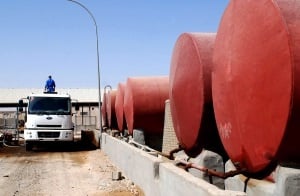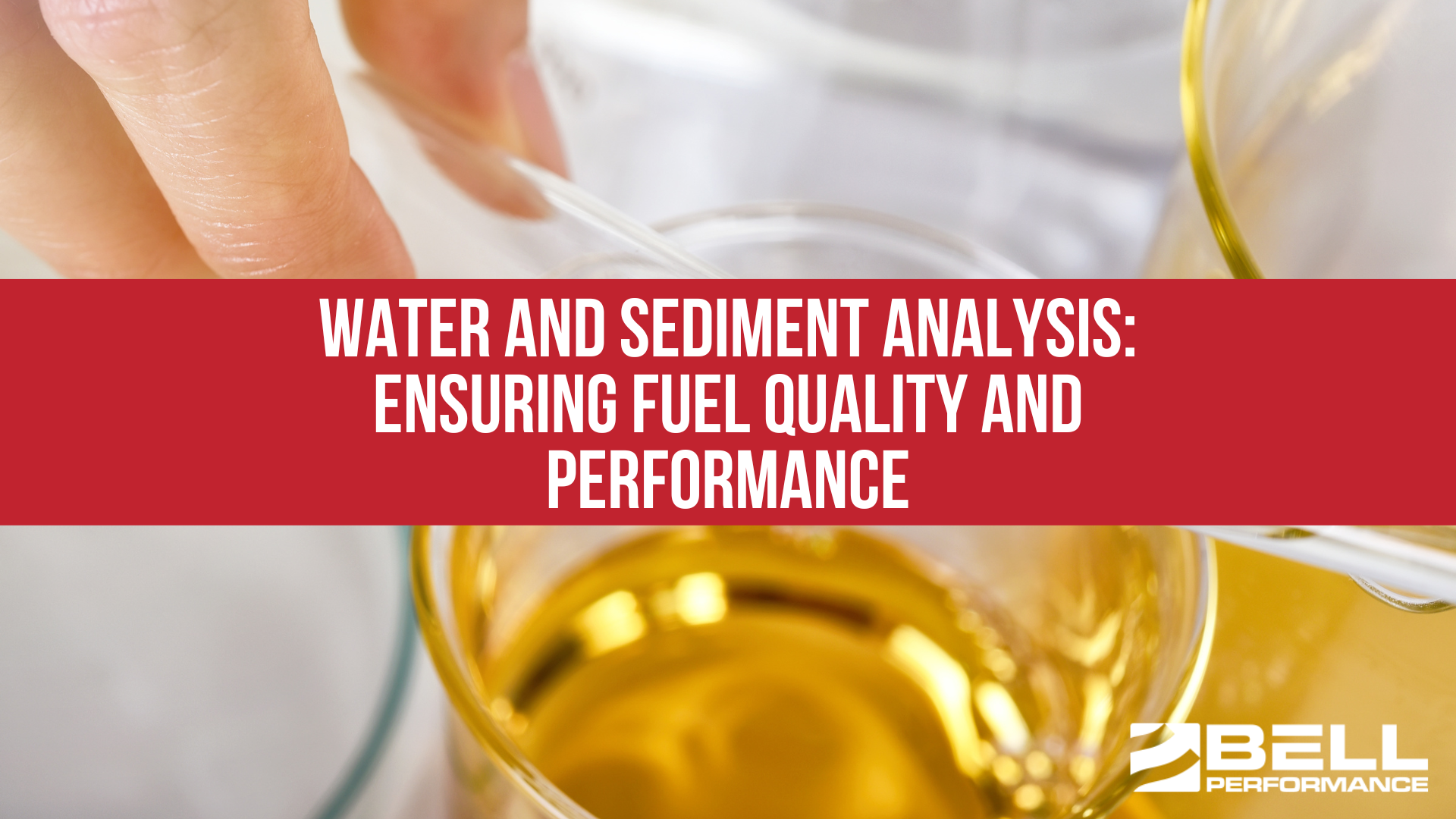A diesel stabilizer can protect during summer fuel storage
The typical conditions of summer work together to decrease the effective storage life of diesel fuel. That’s especially true with ultra-low sulfur...

Anyone who works with diesel fuel, stored or otherwise, knows that water comes with the fuel territory. Water in fuel can cause problems all year round. When the weather turns colder, water problems don't go away, either. Cold weather brings new water problems, plus amplifications of other problem issues.
Here are seven must-knows on diesel+water (plus the symptoms of water in diesel fuel) that can save you headaches:
When you store diesel fuel, it undergoes chemical reactions which may turn the diesel fuel quality south. Two main classes of chemical reactions do this. Oxidation reactions happen when the fuel is exposed to oxygen (or oxygen-bearing substances). Hydrolysis reactions happen when the fuel is exposed to water. Both of these reactions cause chain reactions to happen in the fuel, with the results being darkened fuel that has gums, varnishes, and sludge dropping out of it.
Microbes (bacteria and fungus) in diesel fuel is a nasty problem that turns up too many times. Once they're in there and multiplying, they're hard to get rid of. Water is the essential element that microbes need to establish themselves and multiply, because they live in the water-diesel interface.
Keep in mind, though, that we're not saying water presence is the only thing that determines if you've got a microbe problem. But a tank that has only a little water in it is at less risk of developing this problematic situation. And by problematic, we mean that once they're in there, the microbes are producing acids that wreck fuel quality and corrode tanks, they're making biomass that sticks to the surface and clogs filters and accelerates corrosion damage, and they're staying put there until you put out extra money to get rid of them through using a biocide.
With many entities switching to 2% or 5% bio blends (in many states, you can put up to 5% bio into diesel and not have to label it as such), they're finding that using biodiesel doesn't make them immune to water issues. In some ways, you have a greater potential for water-based problems in biodiesel vs. regular ULSD. Biodiesel methyl esters like to attract and hold onto water.
Since water contributes to instability, you have to recognize that that portion of the blend that is bio-based will have its own stability issues (the bio-portion is more prone to instability caused by water). Not only that, but microbes love to feed on biodiesel more so than regular diesel. So it's even more important to keep water under control in tanks that you know have even a small percentage of biodiesel in them.
Beyond the issues of darkened fuel and microbes, there are performance indicators that can speak clearly to water problems. When the engine tries to inject water with the fuel, you will experience erratic idling and performance, or the engine may cut out momentarily, especially during acceleration. Any pressure indicators will show varying pressure in the common rail system if you have one of those. Not only this, but you'll get either black or white smoke during engine operation. All of these are reliable symptoms of water in diesel fuel.
Many newer diesel engines utilize common rail injector systems. A poor description of such a system would be that the diesel fuel is cycled through a rail system that fits over the top of the pistons, with the injectors hooked into the rail. A computer controls which injectors fire at what time, for how long, and how much fuel they're injecting.
These modern common rail injection systems are highly technical and operate at very high pressures. This gives them better, more efficient performance. Yet, if you get even a little bit of water in them, it can cause big problems, not the least of which is blown injectors.
Just because we're out of the hot and humid months doesn't mean water problems go away. For one thing, cold diesel fuel has less ability to hold on to dissolved water. As the fuel cools in the winter months, you're bound to see more of that dissolved water (that all diesel fuels have anyway) coming out of the fuel as free or suspended water.
Water freezes in diesel fuel when the temperature gets colder. This is true more so in small systems (i.e. actual engine fuel systems) than in storage tanks, but that's precisely why the problem is serious - it appears in the place where the fuel is actually being used. Most diesel users in the North have encountered freeze problems at some point, whether it's frozen water in the fuel line or, more commonly, frozen water in the filter and in the bowl. The only way to keep this from happening is controlling the water before it gets to freezing temperature.
 The simplest way to control water, if it's in an above-ground tank, is to drain the water off. But many users can't do that, especially if they use underground fuel storage (like gas stations). They can use water coalescing filters, but those have to be changed.
The simplest way to control water, if it's in an above-ground tank, is to drain the water off. But many users can't do that, especially if they use underground fuel storage (like gas stations). They can use water coalescing filters, but those have to be changed.
There are chemical control options available. Additives to control water tend to fall into emulsifying and demulsifying-type options. An emulsifier will make water combine with the fuel (Robert Bell invented one of the first of these back in the 1920s). Keep in mind, though, that more and more of today's modern diesel engines don't want water suspended in the fuel. More often than ever, best practice water control is going to call for a demulsifier. A demulsifier does the opposite of an emulsifier - it makes sure that any water that is floating around in the fuel body drops down to the bottom and out of the fuel. Once it's a free water phase at the tank bottom, it can be removed by mechanical means.
Of course, Bell Performance has offered water-controlling options, both in its multifunction formulas and single-function problem solvers. Bell formulas tend to skew toward emulsifying the water - combining it with the diesel fuel in tiny particles (micelles) that are suspended in the fuel until it passes through the injectors and into the combustion chamber for disposal. Dee-Zol and Marine Dee-Zol fall into this category. Bell also has developed absorbing technologies that absorb water into phase with the fuel so it is seamlessly bound into the water and does not drop out. DFS Plus and Cold Flow Improver utilize this type of technology.
Many times, the best approach for getting and keeping water out of storage tanks involves a combination of mechanical-chemical approaches. Busy customers understand the importance of water-control but don't have the time or personnel resources to implement the best practices. This is when it helps to have someone who can utilize the hybrid approach to get water out of the tank, taking it off your hands.
While Bell Performance has developed effective chemical treatments for decades, it is relatively recent that the Bell FTS Program has been available. It takes into account that best practice care of today's modern diesel fuel involves a three-pronged approach - Chemical, Mechanical, and Testing. You can't properly take care of stored fuel by neglecting any of these.
Whatever you decide to do this winter, stay on top of your water issues. You will save money in the long run by doing so.

The typical conditions of summer work together to decrease the effective storage life of diesel fuel. That’s especially true with ultra-low sulfur...

The world of fuel management is more complex than ever, ensuring fuel quality is paramount to maintaining both the continued health and optimal...
If you fail to eat a healthy, balanced diet, your body isn't going to receive the nutrients that it needs to thrive - hence the old cliché saying...